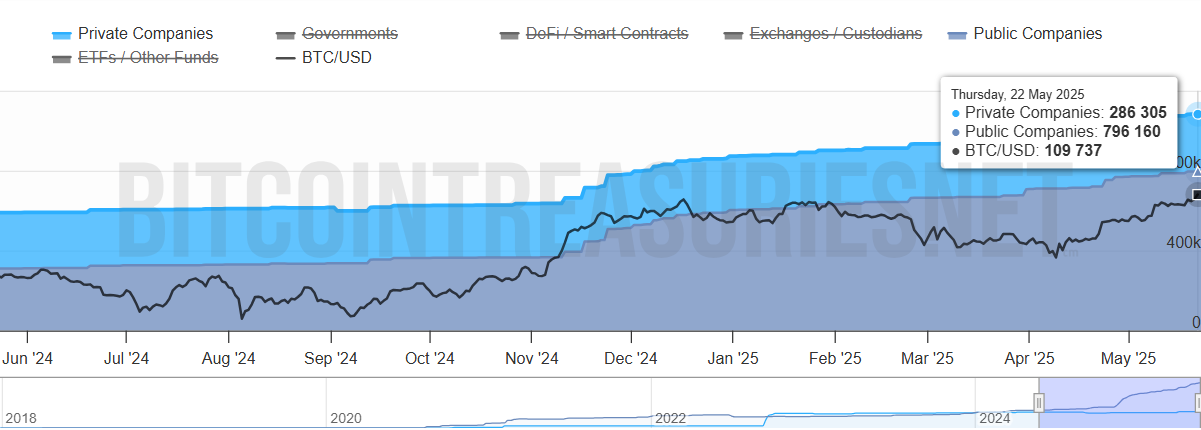As Bitcoin breaks records and reaches an all-time high (ATH), a new wave of investment is emerging. This time, not only investment funds and individual investors are participating, but traditional companies from various sectors are also joining in.
From education and healthcare to housing construction and cybersecurity, companies worldwide are competing to accumulate Bitcoin. They view Bitcoin as a strategic asset, indicating a significant change in how companies perceive cryptocurrencies.
Bitcoin Accumulation by Industry in May
The listed educational company Genius Group recently announced that they have increased their Bitcoin holdings by 40%. This is a measure to strengthen their long-term commitment to digital assets. Meanwhile, Singapore-based medical company Basel Medical Group surprised the market by announcing a $1 billion Bitcoin purchase.
These movements show that Bitcoin is no longer limited to technology or investment companies. It is now expanding into traditionally unrelated fields.
In Europe, H100 Group became the first listed company in Sweden to adopt a Bitcoin holding strategy. The company purchased 4.39 BTC with an initial investment of 5 million NOK. The blockchain group, the first in Europe to start Bitcoin holdings, recently added 227 BTC, increasing their total holdings to 847 BTC, solidifying their pioneering role in the region.
"European companies are stacking Bitcoin," said Nick, CEO and co-founder of Coin View, commenting on the news.
These actions emphasize the increasing acceptance of Bitcoin as a strategic asset, especially as its value reaches new peaks.
Manufacturing and Distribution Join In
Manufacturing and cybersecurity companies are also participating. Modular home manufacturer BOXABL has declared Bitcoin as a reserve asset, indicating the construction industry's shift to digital finance. Simultaneously, the listed US electric vehicle retailer JZXN has approved plans to purchase 1,000 BTC.
The corporate participation from seemingly unrelated industries like automotive and housing shows that Bitcoin is becoming a popular choice for portfolio diversification.
Several Web3-related companies also started Bitcoin holdings in May. Cybersecurity company SecureTech announced its holding strategy. Roxom Global raised $17.9 million to expand Bitcoin holdings and expand its media network.
These efforts reflect a strong ambition to combine digital assets with innovative business models.
Bitcoin Becomes a Macro Asset with Limited Supply
According to a recent BeInCrypto report, retail investors have not significantly participated in this rally. However, continued Bitcoin purchase announcements by companies are showing institutional FOMO (fear of missing out).
Strategy is one of the companies leading this trend. As Bitcoin reaches new peaks, the company's BTC holdings value has surged to $64 billion. But they haven't stopped. The company recently announced plans to continue its Bitcoin purchasing strategy after raising an additional $2.1 billion.

According to Bitcoin Treasury data, private and public companies currently hold over 1 million BTC, which is more than 5.4% of the circulating supply. Meanwhile, Bitcoin's supply remains fixed, and the number of companies accumulating it increases monthly.
"Bitcoin breaking $110,000 reflects a new reality. Bitcoin is no longer a peripheral asset but a macro tool. ETF inflows, sovereign interest, and structurally limited supply are driving institutional demand at scale. For funds holding cash in a low-yield environment, Bitcoin is starting to look like a benchmark, not a risk." – Mike Cahill, CEO of Duro Labs, in an interview with BeInCrypto.
This trend proves that Bitcoin is gaining institutional trust in 2025. It is no longer dismissed as a financial bubble. Instead, it is being recognized as a strategic asset for the future.






